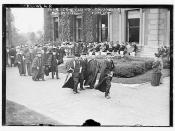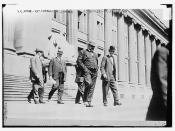Violence in Kansas spilled over into the Congress itself. On May 22 1856, the day after the sack of Lawrence and two days before Brown's Pottawatomie Massacre, a sudden flash of savagery on the Senate floor electrified the whole country. Just two days earlier Senator Charles Sumner of Massachusetts had finished an inflammatory speech in which he described the treatment of Kansas as 'the rape of a virgin territory,' and blamed it on the South's 'depraved longing for a new slave State.' Sumner made Senator Andrew P. Butler of South Carolina a special target of his censure. He charged that Butler was a liar and implied that he kept a slave mistress. Sumner also teased him about a speech impediment caused by a stroke.
Sumner's rudeness caused outrage amongst many, most notably Butler's nephew, Preston S. Brooks, a fiery South Carolina Congressman. Knowing that Sumner would refuse a challenge to a duel, he finally confronted Sumner at his Senate desk on May 22, accused him of libel against South Carolina and Butler, and began beating him about the head with a cane while stunned senators looked on.
Sumner, struggled to rise, wrenched the desk from the floor and collapsed. A gloating Brooks reported: 'Towards the last he bellowed like a calf', and 'I wore my cane out completely but saved the head which is gold.'
For two and a half years Sumner's empty seat was a solemn reminder of the violence done to him. Some thought the senator was feigning injury, others that he really was physically disabled. In fact, although his injuries were bad enough, including two gashes to the skull, he seems to have suffered psychosomatic shock which left him incapable of functioning adequately.
Sumner was to become a Northern anti-slavery martyr. According to Gienapp '...


